
 |
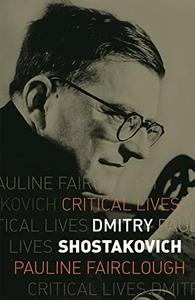 Dmitry Shostakovich (Critical Lives) By Pauline Fairclough 2019 | 192 Pages | ISBN: 1789141273 | PDF | 12 MB Dmitry Shostakovich was one of the most successful composers of the twentieth century-a musician who adapted as no other to the unique pressures of his age. By turns vilified and feted by Stalin during the Great Purge, Shostakovich twice came close to succumbing to the whirlwind of political repression of his times and remained under political surveillance all his life, despite the many privileges and awards heaped upon him in old age. Through it all, Shostakovich showed a remarkable ability to work with, rather than against, prevailing ideological demands, and it was this quality that ensured both his survival and his musical posterity. Pauline Fairclough's absorbing new biography offers a vivid portrait of Shostakovich. Featuring quotations from previously unpublished letters as well as rarely seen photographs, Fairclough's book provides fresh insight into the music and life of a composer whose legacy, above all, was to have written some of the greatest and most cherished music of the last century. 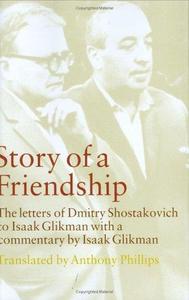 Story of a Friendship: The Letters of Dmitry Shostakovich to Isaak Glikman, 1941-1975 By Dmitry Shostakovich, Isaak Glikman, Anthony Phillips 2001 | 400 Pages | ISBN: 0801439795 | PDF | 9 MB After considerable hesitation and soul-searching I have decided to publish the letters Dmitry Dmitriyevich Shostakovich wrote to me. This choice by the composer's close friend Isaak Glikman brought the tormented feelings of the musical genius into public view. Now those feelings resound in the first substantial collection of Shostakovich's letters to appear in English.From the early 1930s until his death in 1975 Shostakovich wrote regularly to Glikman, a Leningrad theater critic and historian. The 288 letters included in this volume began in 1941, at the time of Operation Barbarossa and the composition of the controversial (Leningrad) Symphony no. 7, and continue until 1974, by which time Shostakovich was too frail to write. Glikman's extensive introduction explains that the earlier letters were lost-presumably left behind when both men were evacuated from besieged Leningrad. In his account of those years, Glikman relates personal details of the composer's life during the height of the Stalinist Terror, including Shostakovich's response to the public humiliation inflicted by the regime after the premiere of his opera Lady Macbeth of Mtsensk.Taken together, the letters and Glikman's fascinating commentary form a portrait of a complex and acutely sensitive personality endowed with enormous moral integrity, humanity, compassion, and a sharp, often self-deprecating, sense of humor. The book recounts some of the most pivotal episodes of Shostakovich's life, including the long withdrawal of the Symphony no. 4, the regime's 1948 attacks on the composer, his subsequent trips to the United States and other Western countries, his frame of mind upon joining the Communist party in 1960, his reactions to the music of his contemporaries, and his composition of the devastating late symphonies and final string quartets.The battles over the politics of Dmitry Shostakovich and his music continue with undiminished vehemence, and Story of a Friendship is sure to occasion still more argument. At the same time, the book provides a unique opportunity better to understand the man and his music, on the one hand, and the regime that alternately hailed and reviled him, on the other. 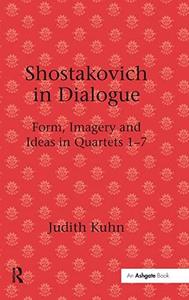 Shostakovich in Dialogue By Judith Kuhn 2010 | 315 Pages | ISBN: 0754664066 | PDF | 6 MB A thorough examination of Shostakovich's string quartets is long overdue. Although they can justifiably lay claim to being the most significant and frequently performed twentieth-century oeuvre for that ensemble, there has been no systematic English-language study of the entire cycle. Judith Kuhn's book begins such a study, undertaken with the belief that, despite a growing awareness of the universality of Shostakovich's music, much remains to be learned from the historical context and an examination of the music's language. Much of the controversy about Shostakovich's music has been related to questions of meaning. The conflicting interpretations put forth by scholars during the musicological 'Shostakovich wars' have shown the impossibility of fixing a single meaning in the composer's music. Commentators have often heard the quartets as political in nature, although there have been contradictory views as to whether Shostakovich was a loyal communist or a dissident. The works are also often described as vivid narratives, perhaps a confessional autobiography or a chronicle of the composer's times. The cycle has also been heard to examine major philosophical issues posed by the composer's life and times, including war, death, love, the conflict of forces of good and evil, the nature of subjectivity, the power of creativity and the place of the individual - and particularly the artist - in society. Soviet commentaries on the quartets typically describe the works through the lens of Socialist-Realist mythological master narratives. Recent Western commentaries see Shostakovich's quartets as expressions of broader twentieth-century subjectivity, filled with ruptures and uncertainty. What musical features enable these diverse interpretations? Kuhn examines each quartet in turn, looking first at its historical and biographical context, with special attention to the cultural questions being discussed at the time of its writing. She then surveys the work's reception history, and follows with a critical discussion of the quartet's architectural and harmonic features. Using the new tools of Sonata Theory, Kuhn provides a fresh analytical approach to Shostakovich's music, giving valuable and detailed insights into the quartets, showing how the composer's mastery of form has enabled these works to be heard as active participants in the Soviet and Western cultural discourses of their time, while remaining compelling and relevant to twenty-first-century listeners. 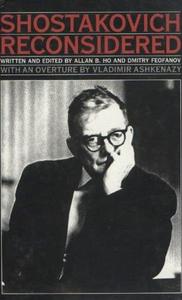 Shostakovich Reconsidered By Allan B. Ho, Dmitry Feofanov 1998 | 788 Pages | ISBN: 0907689566 | PDF | 11 MB Dmitry Shostakovich's memoirs, Testimony, `related to and edited by Solomon Volkov', have been the subject of fierce debate since their publication in 1979. Was Testimony a forgery, made up by an impudent impostor, or was it the deathbed confession of a bent, but unbroken, man? Even now, years after the fall of the communist regime, a coterie of well-placed Western musicologists have regularly raised objections to Testimony, hoping with each attack to undermine the picture of Shostakovich presented in his memoirs that of a man of enormous moral stature, bitterly disillusioned with the Soviet system. Here, Allan Ho and Dmitry Feofanov systematically address all of the accusations levelled at Testimony and Solomon Volkov, Shostakovich's amanuensis, amassing an enormous amount of material about Shostakovich and his position in Soviet society and burying forever the picture of Shostakovich as a willing participant in the communist charade. ALLAN B. HO is a musicologist, DMITRY FEOFANOV a lawyer and pianist. 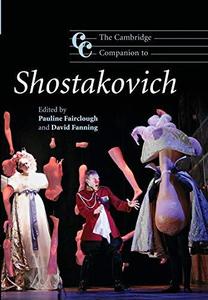 The Cambridge Companion to Shostakovich By Pauline Fairclough, David Fanning 2008 | 416 Pages | ISBN: 0521603153 | PDF | 7 MB As the Soviet Union's foremost composer, Shostakovich's status in the West has always been problematic. Regarded by some as a collaborator, and by others as a symbol of moral resistance, both he and his music met with approval and condemnation in equal measure. The demise of the Communist state has, if anything, been accompanied by a bolstering of his reputation, but critical engagement with his multi-faceted achievements has been patchy. This Companion offers a starting point and a guide for readers who seek a fuller understanding of Shostakovich's place in the history of music. Bringing together an international team of scholars, the book brings research to bear on the full range of Shostakovich's musical output, addressing scholars, students and all those interested in this complex, iconic figure. 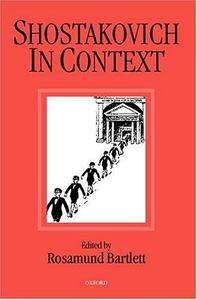 Shostakovich in Context By Rosamund Bartlett 2000 | 248 Pages | ISBN: 0198166664 | PDF | 6 MB This volume presents recent research into Dmitri Shostakovich's life (1906-1975) and work by leading British, American, Russian, and Israeli scholars. It is occasioned by the ever-growing interest in a composer whose significance in and for the history of twentieth-century music is, as Richard Taruskin has commented, immense, possibly unparalleled and above all, continuing. The authors of the thirteen articles are musicologists, Russian literature specialists, biographers, and cultural historians, whose diverse fields of expertise are reflected in the interdisciplinary nature of the materials collected here. The collection presents Shostakovich and his legacy in a variety of different contexts and its interdisciplinary nature will also serve to open up discussion. In this way, it breaks from previous tendencies to focus on the purely extrinsic qualities of the composers musical oeuvre, which has so often been interpreted in terms of autobiography. The chapters span the composers entire career and contain substantial amounts of new information about Shostakovich and his musical legacy. 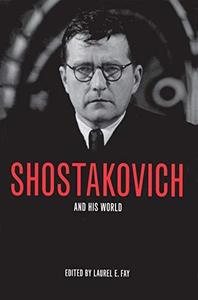 Shostakovich and His World By Laurel E. Fay 2004 | 429 Pages | ISBN: 0691120692 | PDF | 8 MB Dmitri Shostakovich (1906-1975) has a reputation as one of the leading composers of the twentieth century. But the story of his controversial role in history is still being told, and his full measure as a musician still being taken. This collection of essays goes far in expanding the traditional purview of Shostakovich's world, exploring the composer's creativity and art in terms of the expectations--historical, cultural, and political--that forged them. The collection contains documents that appear for the first time in English. Letters that young "Miti" wrote to his mother offer a glimpse into his dreams and ambitions at the outset of his career. Shostakovich's answers to a 1927 questionnaire reveal much about his formative tastes in the arts and the way he experienced the creative process. His previously unknown letters to Stalin shed new light on Shostakovich's position within the Soviet artistic elite. The essays delve into neglected aspects of Shostakovich's formidable legacy. Simon Morrison provides an in-depth examination of the choreography, costumes, décor, and music of his ballet The Bolt and Gerard McBurney of the musical references, parodies, and quotations in his operetta Moscow, Cheryomushki. David Fanning looks at Shostakovich's activities as a pedagogue and the mark they left on his students' and his own music. Peter J. Schmelz explores the composer's late-period adoption of twelve-tone writing in the context of the distinctively "Soviet" practice of serialism. Other contributors include Caryl Emerson, Christopher H. Gibbs, Levon Hakobian, Leonid Maximenkov, and Rosa Sadykhova. In a provocative concluding essay, Leon Botstein reflects on the different ways listeners approach the music of Shostakovich. 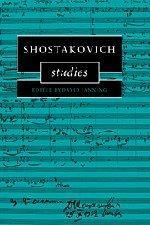 Shostakovich Studies By David Fanning 1995 | 292 Pages | ISBN: 0521452392 | PDF | 6 MB Few composers' posthumous reputations have grown as steadily as Shostakovich's. Yet outside the concert hall the focus of attention seems to have been on the extraordinary circumstances of his life rather than on the music itself. This book seeks to show that the power of his work stems as much from its craftsmanship as from its political and personal context. The eleven essays lay a foundation for a proper understanding of Shostakovich's musical language as well as providing new insights into the issues surrounding his composition. 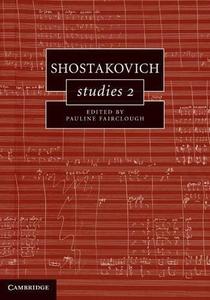 Shostakovich Studies 2 By Pauline Fairclough 2010 | 339 Pages | ISBN: 0521111188 | PDF | 11 MB When Shostakovich Studies was published in 1995, archival research in the ex-Soviet Union was only just beginning. Since that time, research carried out in the Shostakovich Family Archive, founded by the composer's widow Irina Antonovna Shostakovich in 1975, and the Glinka Museum of Musical Culture has significantly raised the level of international Shostakovich studies. At the same time, scholarly understanding of Soviet society and culture has developed significantly since 1991, and this has also led to a more nuanced appreciation of Shostakovich's public and professional identity. Shostakovich Studies 2 reflects these changes, focusing on documentary research, manuscript sources, film studies and musical analysis informed by literary criticism and performance. Contributions in this volume include chapters on Orango, Shostakovich's diary, behind-the-scenes events following Pravda's criticisms of Shostakovich in 1936 and a new memoir of Shostakovich by the Soviet poet Evgeniy Dolmatovsky, as well as analytical studies from a range of perspectives. 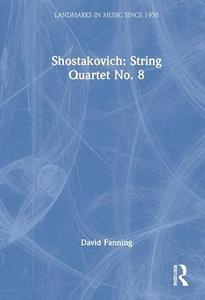 Shostakovich: String Quartet No. 8 By David Fanning 2004 | 204 Pages | ISBN: 0754606996 | PDF | 5 MB When it was first performed in October 1960, Shostakovich's Eighth String Quartet was greeted with a standing ovation and was given a full encore. Its popularity has continued to the present day with over 100 commercial recordings appearing over the last 40 years. The appeal of the work is not hard to identify. Immediately communicative, the quartet also contains rich seams of deeper meaning. This book examines its musical design in detail and seeks to overthrow the charges of superficiality that have arisen as a result of the work's popular success. The core of the study is the close analysis of the work, but this is placed in context with a discussion of Shostakovich's reputation and historical position, the circumstances of the quartet's composition and the subsequent controversies that have surrounded it. The work was composed during the so-called "Thaw" years of the Soviet Union, and the cultural and political background of this period is considered, together with Shostakovich's life and work during this time. David Fanning argues that the Eighth String Quartet is a landmark in 20th-century music in its transcendence of the extra-musical meanings that it invokes; that it is "music that liberates itself from the shackles of its contexts." |